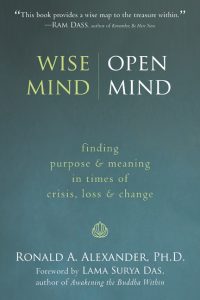
In a crisis, we’re likely to resist change and give in to fear of the unknown. Yet the ancient Buddhist practice of mindfulness, remaining fully aware of what you are experiencing in the present moment, is the key to bringing yourself out of suffering and back into happiness.
Mindfulness is a process of linking awareness with attention in order to develop, expand, and enhance both. It results in more focused and heightened concentration: You observe your thoughts and feelings rather than become immersed in them. You become aware that you have two selves, the self that’s having the experience and the self that is witnessing it and is separate from it.
When we’re experiencing a challenging situation the more we engage in the egoic mind or false self, the harder it is to handle it. The ego must move out of the way if we’re to immerse ourselves in the creative transformation necessary to emerge from the crisis. In the state of open mind, the ego’s voice is but a whisper, drowned out by the call of our soul.
To prevent the false self from taking charge, spiritual teacher Ram Dass suggests the dramatic step of an advanced practice he calls “going into nobody training” (Dass 2007). “Becoming nobody” means letting go of your preconceived notions about your roles and practicing open mind, allowing yourself to discover what’s beyond those roles that the false self fiercely clings to, because even the most positive role can limit us and hold us back.
 The more you cultivate meditation and enter into the state of open mind, the easier it is to stop running away from difficult feelings; to make the choice to break out of denial, stagnation, and suffering; and to act with mindful intention. To help you mindfully achieve a witnessing state, follow these tips from my book Wise Mind, Open Mind.
The more you cultivate meditation and enter into the state of open mind, the easier it is to stop running away from difficult feelings; to make the choice to break out of denial, stagnation, and suffering; and to act with mindful intention. To help you mindfully achieve a witnessing state, follow these tips from my book Wise Mind, Open Mind.
First, you allow this witnessing self to emerge in your consciousness. Then, instead of thinking about, analyzing, and building upon a sensation or feeling, such a sense of panic or sadness, you simply observe it as it arises. Then you catalog it as “not worthy of further exploration” or “something to contemplate later to see what I can learn from it,” and let it drift out of your awareness.
As you meditate and allow the witnessing mind to sort through what arises, you’ll find that most of what it generates has little significance. The more you experience this process, the easier it will be to avoid jumping onto your thoughts or feelings and riding them like a wild horse wherever they take you. Peacefulness and joy can arise in you as you let that wild horse ride off into the distance.
The dual awareness that arises when you allow the witnessing mind to come in fosters the courage to fully experience even the most painful emotions, beliefs, and memories, and tolerate any accompanying physical sensations. The witnessing mind knows that you’re separate from your circumstances, so you feel safer than if your awareness were completely absorbed in those thoughts and feelings. Remain present in your suffering until it passes, and it will.
The great opportunity in any crisis is that it can awaken you to your desire for meaning, for living more authentically, more vibrantly.
Adapted from Ronald Alexander’s book “Wise Mind, Open Mind: Finding Purpose and Meaning in Times of Crisis, Loss, and Change” (New Harbinger Publications, 2009).